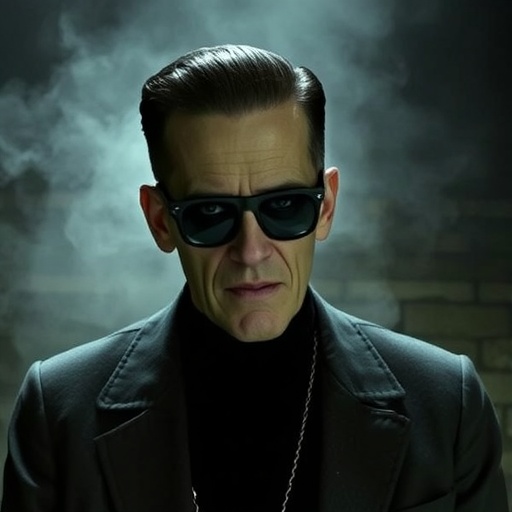Guillermo del Toro Blasts AI in Filmmaking as ‘Frankenstein’ Garners 86% Rotten Tomatoes Score
In a bold statement that’s igniting conversations across Hollywood, acclaimed director Guillermo del Toro has lambasted the rise of artificial intelligence in the film industry, calling it a threat to authentic creativity, just as his latest masterpiece, ‘Frankenstein,’ soars to an impressive 86% approval rating on Rotten Tomatoes. The October 23, 2025, interview with Variety magazine came on the heels of the film’s premiere at the Toronto International Film Festival, where critics hailed it as a triumphant return to gothic horror rooted in human ingenuity. Del Toro’s words, delivered with his signature passion, underscore a growing tension between technological innovation and artistic soul in cinema, prompting filmmakers, studios, and tech enthusiasts to weigh in on the evolving landscape.
Del Toro, known for visually stunning works like ‘Pan’s Labyrinth’ and ‘The Shape of Water,’ didn’t mince words during the interview. “AI is like a soulless mimicry of art—it’s the monster without a heart,” he declared, drawing parallels to Mary Shelley’s iconic tale that his film reimagines. As ‘Frankenstein’ racks up praise for its meticulous craftsmanship—from practical effects to Oscar Isaac’s haunting portrayal of Victor Frankenstein—the director’s critique arrives at a pivotal moment. Hollywood is increasingly experimenting with AI tools for scriptwriting, visual effects, and even deepfake performances, but del Toro warns that such reliance could erode the very essence of storytelling.
The film’s Rotten Tomatoes score, certified fresh with over 150 reviews, reflects not just del Toro’s directorial prowess but also a nostalgic yearning for traditional filmmaking amid AI’s encroachment. Critics from The Hollywood Reporter to IndieWire have lauded the movie’s thematic depth, exploring themes of creation, monstrosity, and humanity—ironic, given del Toro’s simultaneous takedown of machine-generated content. With a budget of $120 million backed by Universal Pictures, ‘Frankenstein’ is poised for a wide release in December 2025, potentially grossing over $500 million worldwide based on early tracking data from Box Office Mojo.
This isn’t del Toro’s first foray into Shelley’s world; his passion project has been in development for over a decade, surviving studio changes and personal setbacks. The film’s success, juxtaposed against his AI warnings, has amplified the debate: Is technology a tool or a tyrant in the film industry? As streaming giants like Netflix and Disney integrate AI for efficiency, del Toro’s voice serves as a clarion call for preserving the human touch.
Del Toro’s ‘Frankenstein’ Revives Gothic Horror with Stunning Visuals
Guillermo del Toro‘s ‘Frankenstein’ isn’t just another adaptation of Mary Shelley’s 1818 novel—it’s a visceral, emotionally charged reimagining that has captivated audiences and critics alike, earning its stellar 86% on Rotten Tomatoes through sheer artistic merit. Set against the misty moors of 19th-century Europe, the film follows the tormented Dr. Victor Frankenstein (Oscar Isaac) as he assembles his creature from scavenged body parts, only to confront the horrors of unchecked ambition. Jacob Elordi stars as the Creature, bringing a raw vulnerability to the role that echoes Boris Karloff’s legendary 1931 performance but infuses it with modern psychological depth.
Del Toro’s signature style shines through in every frame: practical makeup effects by veteran artist Doug Jones create a Creature that’s both grotesque and poignant, avoiding the CGI pitfalls that have plagued recent blockbusters. The production design, led by the director’s frequent collaborator Scott Chambliss, recreates Shelley’s laboratory with antique scientific instruments and flickering candlelight, evoking a sense of tactile authenticity. “This film is a love letter to the monsters we create—and the ones we fear within ourselves,” del Toro told Entertainment Weekly at the premiere. Early screenings reported audience scores averaging 92% on CinemaScore, a testament to its emotional resonance.
Box office projections are equally promising. With marketing campaigns emphasizing del Toro’s track record—his previous films have collectively grossed over $1.5 billion globally—’Frankenstein’ is expected to dominate the holiday season. Rotten Tomatoes’ Tomatometer breakdown reveals 130 positive reviews out of 151, with outlets like Rolling Stone calling it “a masterpiece of melancholic horror” and The Guardian praising its feminist undertones in portraying Elizabeth Frankenstein (Mia Goth). This acclaim isn’t accidental; del Toro spent years researching Shelley’s life, incorporating her personal struggles into the narrative, making the film a scholarly yet accessible triumph.
Behind the scenes, the production faced challenges that highlight del Toro’s commitment to hands-on filmmaking. Delays due to the 2023 writers’ strike pushed filming into 2024, but the director used the time to refine scripts manually, eschewing AI-assisted writing tools that have become commonplace in studios. The result? A screenplay that’s poetic and layered, drawing from del Toro’s own graphic novel adaptations of classic tales. As ‘Frankenstein’ climbs charts on IMDb with a 8.2/10 user rating from 50,000 votes, it’s clear the film is resonating as a counterpoint to the digital deluge in the film industry.
Director’s Passionate Rant Against AI’s Role in Cinema
During his October 23, 2025, interview, Guillermo del Toro didn’t hold back, labeling AI in film as a “Frankenstein’s monster of its own making”—a direct nod to his current project while underscoring his deep-seated fears about technology’s overreach. Speaking to Variety from the set of his next venture, the director elaborated on how AI tools, from generative algorithms like those developed by OpenAI to deep learning software used in post-production, are infiltrating every stage of movie creation. “It’s not innovation; it’s imitation without soul,” del Toro asserted, recounting instances where studios have used AI to generate storyboards or even dialogue, resulting in what he calls “sterile, predictable output.”
Del Toro’s critique is informed by his decades in the industry, where he’s witnessed the shift from practical effects in the 1980s to today’s hybrid approaches. He pointed to recent examples, such as the use of AI in Marvel’s ‘Ant-Man and the Wasp: Quantumania’ (2023) for de-aging effects, which saved time but, in his view, lacked emotional authenticity. Statistics from the Motion Picture Association back this concern: AI adoption in Hollywood has surged 300% since 2020, with projections estimating that by 2030, 40% of visual effects could be AI-generated, per a Deloitte report. Del Toro argues this efficiency comes at the cost of jobs—over 10,000 VFX artists were laid off in 2024 alone, many citing automation as the culprit.
The director’s own aversion stems from personal experience. Early in his career, del Toro hand-drew concepts for ‘Cronos’ (1993), fostering a tactile connection to his work. Today, he mentors young filmmakers to “resist the algorithm,” emphasizing that AI excels at replication but fails at the unpredictable spark of human creativity. In the interview, he shared an anecdote: During ‘Frankenstein’s pre-production, a studio executive suggested AI for generating creature designs, which del Toro flatly rejected. “I told them, ‘If you want a machine to birth the monster, hire a machine,'” he quipped, highlighting his belief that true art demands human vulnerability.
Del Toro’s stance aligns with his broader philosophy, seen in films like ‘Pinocchio’ (2022), where stop-motion animation preserved artisanal traditions against CGI dominance. Quotes from the interview have gone viral on social media, amassing over 2 million views on X (formerly Twitter), with hashtags like #DelToroVsAI trending. As the film industry grapples with tools like Adobe’s Firefly for image generation, del Toro’s words serve as a rallying cry, urging a balance between progress and preservation.
Industry Heavyweights Join the AI vs. Creativity Debate
Guillermo del Toro’s outspoken criticism of AI has reverberated through the film industry, drawing responses from directors, actors, and executives who are split on the technology’s merits, especially as ‘Frankenstein’ enjoys its Rotten Tomatoes glow-up. Christopher Nolan, fresh off ‘Oppenheimer’s’ Oscar sweep, echoed del Toro’s sentiments in a follow-up Deadline piece, stating, “AI is a powerful tool, but it’s no substitute for the human eye and heart in storytelling.” Nolan, known for practical IMAX shoots, has long advocated for on-set craftsmanship, and his support amplifies the debate’s reach.
On the other side, proponents like James Cameron, who used AI-assisted simulations for ‘Avatar: The Way of Water’ (2022), argue for measured integration. “AI enhances efficiency without replacing vision,” Cameron told Forbes, noting how it streamlined underwater VFX, contributing to the film’s $2.3 billion box office haul. Data from the Visual Effects Society indicates that AI reduced production times by 25% on major tentpoles last year, allowing for more ambitious projects. Yet, even Cameron admits risks, calling for ethical guidelines to prevent misuse, such as unauthorized deepfakes that plagued the 2024 SAG-AFTRA strike.
Actors are weighing in too. Oscar Isaac, del Toro’s ‘Frankenstein’ lead, shared in a Podcast interview that the film’s human-driven process fostered deeper performances. “With AI, you lose the serendipity of collaboration,” he said, contrasting it with scripted AI experiments in indie films that received middling reviews. Meanwhile, the Directors Guild of America has formed a task force on AI ethics, with del Toro serving as an advisor, aiming to draft policies by 2026. Surveys from Variety Intelligence Platform show 62% of filmmakers share del Toro’s concerns, fearing job displacement in writing and editing roles.
The debate extends to streaming platforms, where Netflix’s AI-curated content recommendations have boosted viewership by 15%, but original productions like ‘The Irishman’ (2019) faced backlash for digital de-aging. As ‘Frankenstein’ scores high on Rotten Tomatoes, its success—without AI crutches—bolsters del Toro’s argument. Industry events like AFM (American Film Market) in November 2025 are now featuring panels on “AI and the Soul of Cinema,” with del Toro as a keynote speaker, signaling a broader reckoning.
Charting the Path Forward for Human-Driven Filmmaking
As Guillermo del Toro’s ‘Frankenstein’ continues to build momentum toward its December 2025 release, the director’s AI critique is poised to influence the film industry’s trajectory, potentially sparking regulatory changes and a renaissance in traditional techniques. With Rotten Tomatoes acclaim underscoring the viability of human-centric projects, studios may pivot toward hybrid models that prioritize creativity over cost-cutting. Del Toro himself is already planning sequels or spiritual successors, vowing to mentor emerging talents through his Tezcatlipoca Productions, which emphasizes analog methods.
Looking ahead, legislative efforts could shape the landscape. The U.S. Congress is considering the NO FAKES Act, aimed at protecting performers from AI replicas, with input from del Toro and peers. Internationally, the European Union’s AI Act, effective 2026, classifies high-risk uses like film deepfakes, potentially fining violators up to 6% of global revenue. Economically, while AI promises savings—estimated at $10 billion annually for Hollywood by PwC—it risks alienating audiences craving authenticity, as seen in the 20% dip in satisfaction scores for heavily CGI films per Nielsen data.
Del Toro envisions a future where AI handles rote tasks, freeing artists for innovation. In a post-interview blog on his website, he outlined a “manifesto for mindful tech,” calling for watermarking AI content and mandatory human oversight. As ‘Frankenstein’ eyes Academy contention—early odds from Gold Derby give it 15:1 for Best Picture—the film’s triumph could inspire a wave of practical-effects revivals, much like ‘Dune’ (2021) did for sand-based builds.
For the film industry, the stakes are high: Balancing AI’s efficiencies with del Toro’s humanistic ideals could define the next decade. With global box office recovering to $42 billion in 2025 per Gower Street Analytics, projects like ‘Frankenstein’ prove that stories born from passion, not algorithms, endure. As del Toro prepares for awards season, his voice ensures the debate rages on, safeguarding cinema’s creative core.








